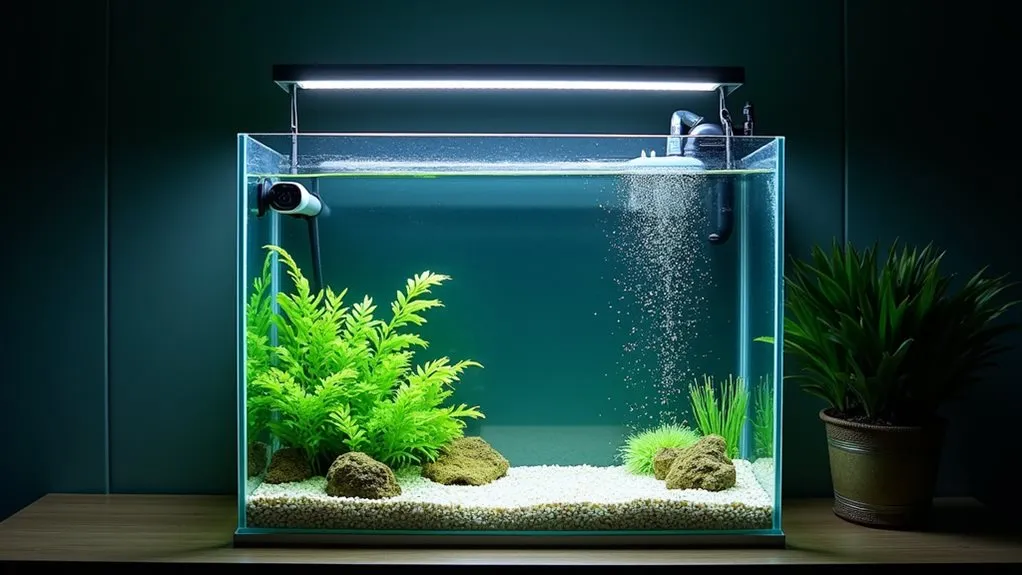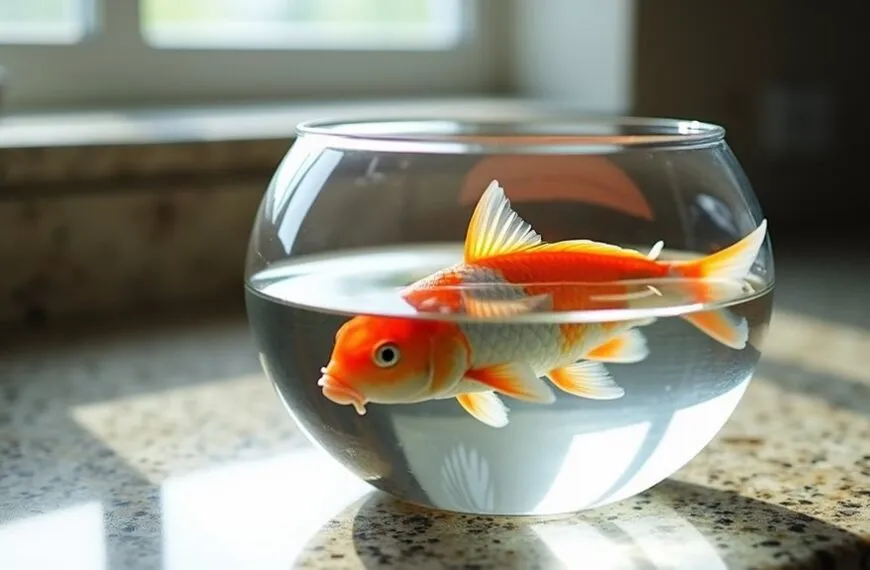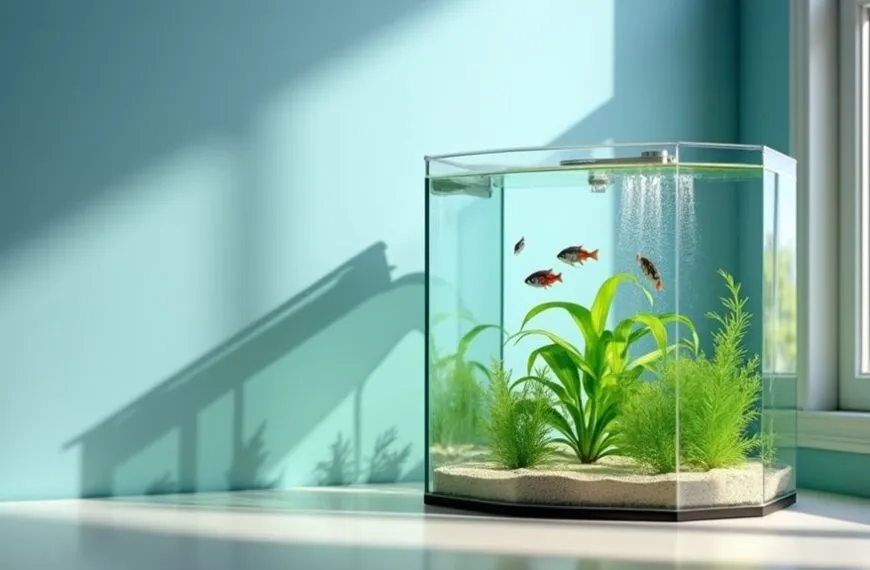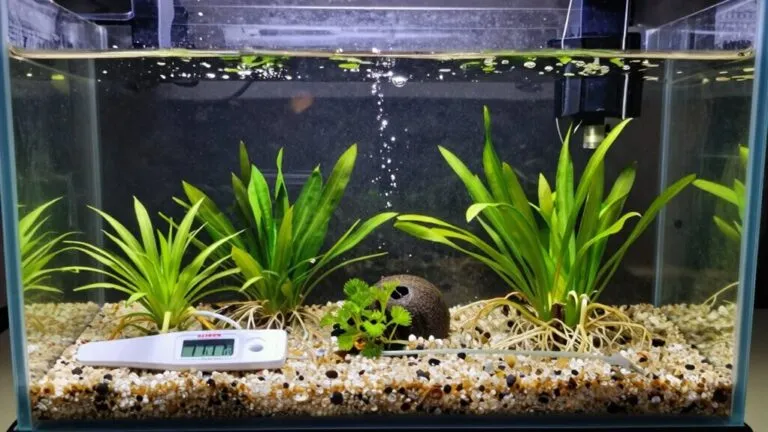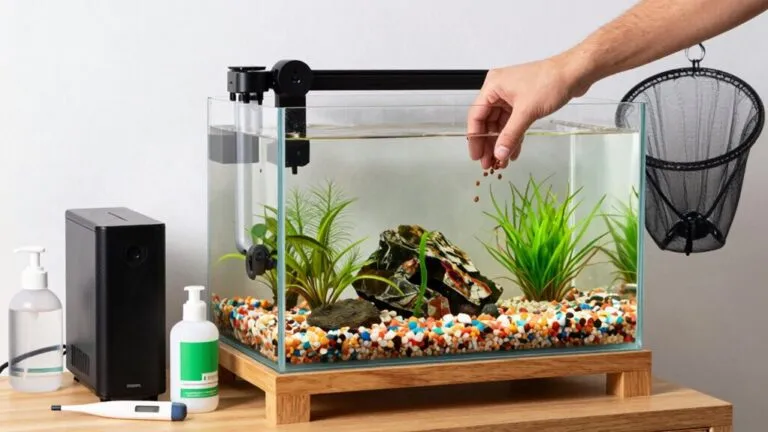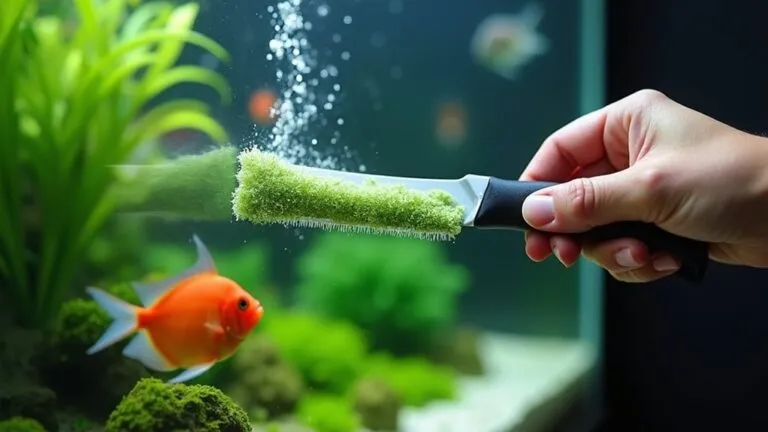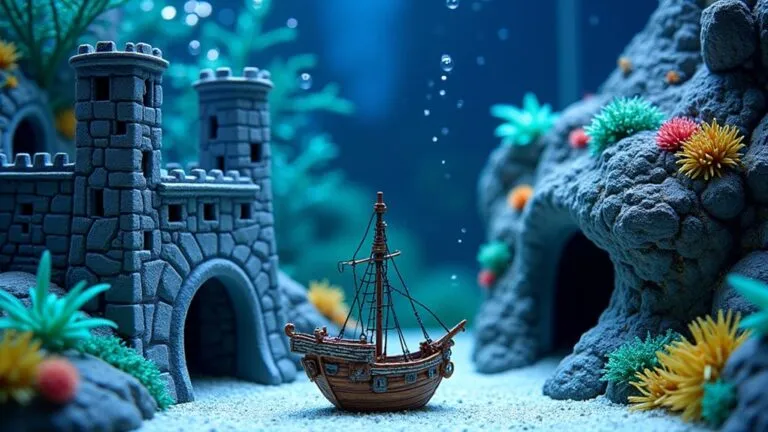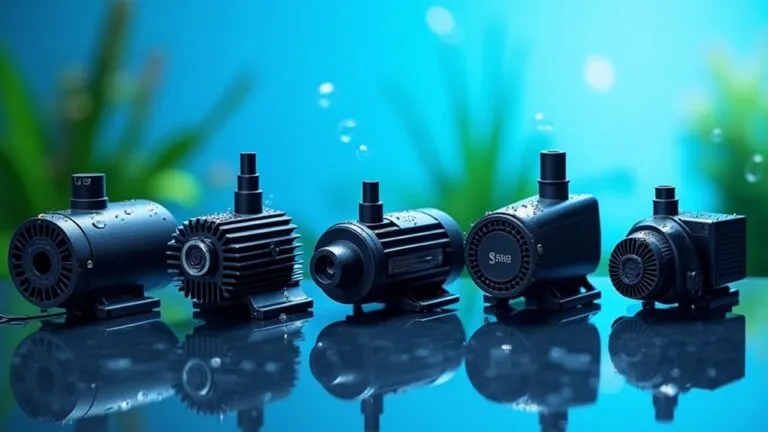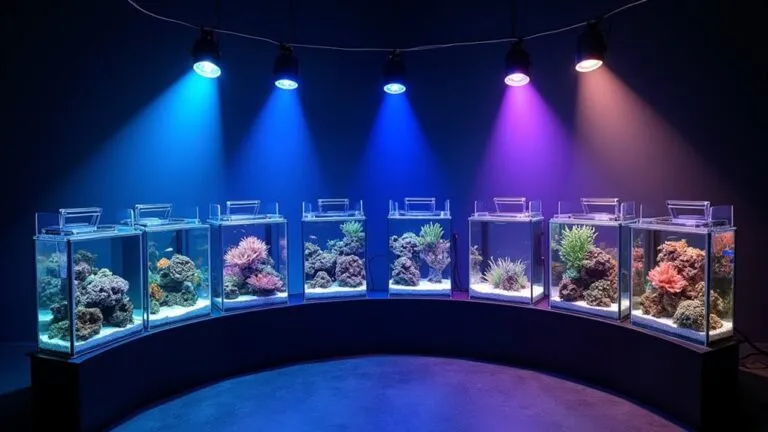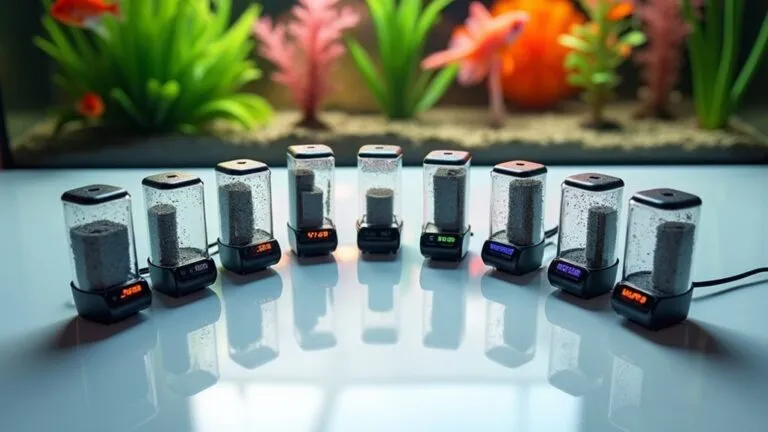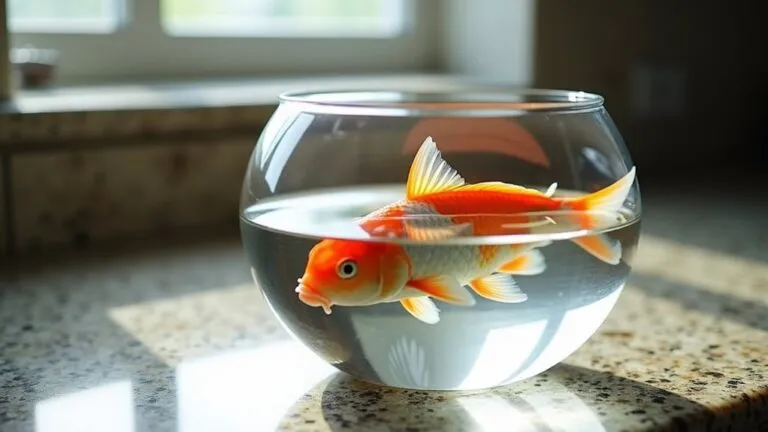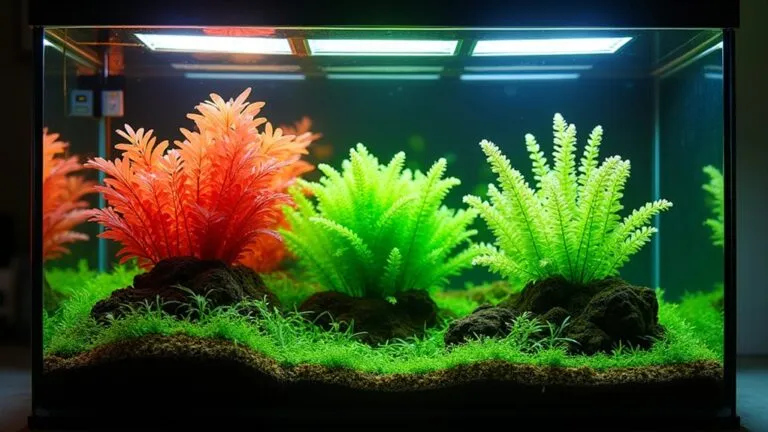To keep your fish tank from smelling, you'll need to maintain a consistent cleaning routine and proper filtration system. Start with regular water changes (25% every 1-2 weeks), vacuum the gravel to remove debris, and monitor your filter's performance daily. Don't overfeed your fish – only offer what they can eat in 2-5 minutes – and remove uneaten food promptly. Keep an eye on water quality by testing ammonia, nitrite, and nitrate levels regularly, and guarantee you're not overcrowding your tank with too many fish. Add air stones or wavemakers to improve circulation and oxygen levels. There's plenty more to discover about creating the perfect aquatic environment for your finned friends.
Contents
- 1 Understanding Fish Tank Odors
- 2 Primary Causes of Tank Smells
- 3 Essential Cleaning and Maintenance Steps
- 4 Proper Filtration Systems
- 5 Water Quality Management
- 6 Feeding and Stocking Guidelines
- 7 Air Circulation Solutions
- 8 Frequently Asked Questions
- 8.1 Can Fish Tank Odors Affect My Pet Cat or Dog's Health?
- 8.2 Why Does My Tank Smell Worse After Adding New Decorations?
- 8.3 Does Using Air Fresheners Around My Aquarium Harm the Fish?
- 8.4 Should I Add Salt to Reduce Tank Odors in Freshwater Aquariums?
- 8.5 Can Outdoor Temperatures Affect How Much My Fish Tank Smells?
- 9 Final Thoughts
Understanding Fish Tank Odors
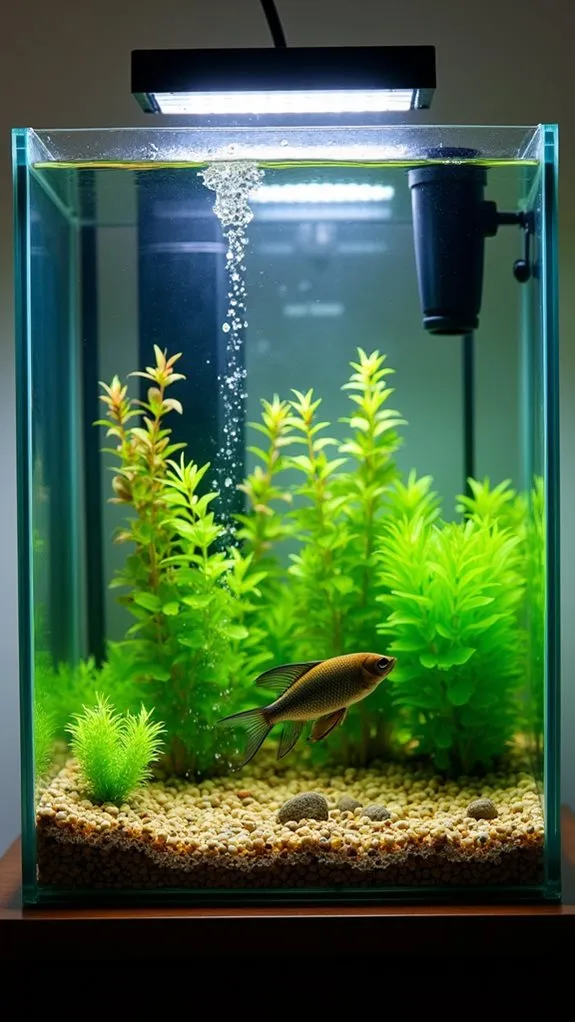
Anyone who's maintained an aquarium knows that unpleasant odors can develop if the tank isn't properly cared for. Understanding the odor composition of your aquarium is essential because it can tell you a lot about your tank's health and your fish behavior. When you notice unusual smells, it's often your first clue that something needs attention.
The main culprits behind those unwanted tank odors are usually hiding in plain sight. You'll find decomposing organic matter, like uneaten food settling at the bottom, dead plant leaves floating around, or worse – a deceased fish that's tucked away in a corner. A dirty filter can release foul odors back into your aquarium water. Maintaining water changes biweekly is crucial for preventing stagnant conditions that promote bacteria growth. Additionally, poor water quality can contribute to unpleasant odors, highlighting the importance of regularly testing water parameters for optimal conditions.
If you've got too many fish in your tank, their waste can quickly overwhelm your filtration system and create that distinctive "fishy" smell you're trying to avoid.
To stay on top of potential odor issues, you'll want to make regular tank inspections part of your routine. Check the substrate for built-up debris, examine your plants for dying leaves, and test your water parameters frequently.
Primary Causes of Tank Smells
When you're dealing with a smelly fish tank, it's crucial to identify the root causes of those unpleasant odors. The most common culprit is decomposing organic matter, which includes everything from uneaten food and dead plants to fish waste settling at the bottom of your tank. Think of it as a tiny underwater compost pile that you definitely don't want! Regular gravel vacuuming helps remove these waste materials before they become problematic.
Another major issue you might face is biological overload, which happens when your tank's ecosystem gets overwhelmed. If you've got too many fish in your aquarium (we know it's tempting to add "just one more"!), or if your filtration system isn't keeping up with the waste production, you're bound to notice some funky smells. Checking for missing dead fish in hidden spots is essential since decomposing bodies can significantly impact water quality.
Poor maintenance practices, like skipping water changes or letting your filter get clogged, can make matters worse.
Chemical factors play a role too. While products like activated carbon and zeolite can help control odors, using too much water conditioner might ironically lead to that dreaded rotten-egg smell.
Essential Cleaning and Maintenance Steps
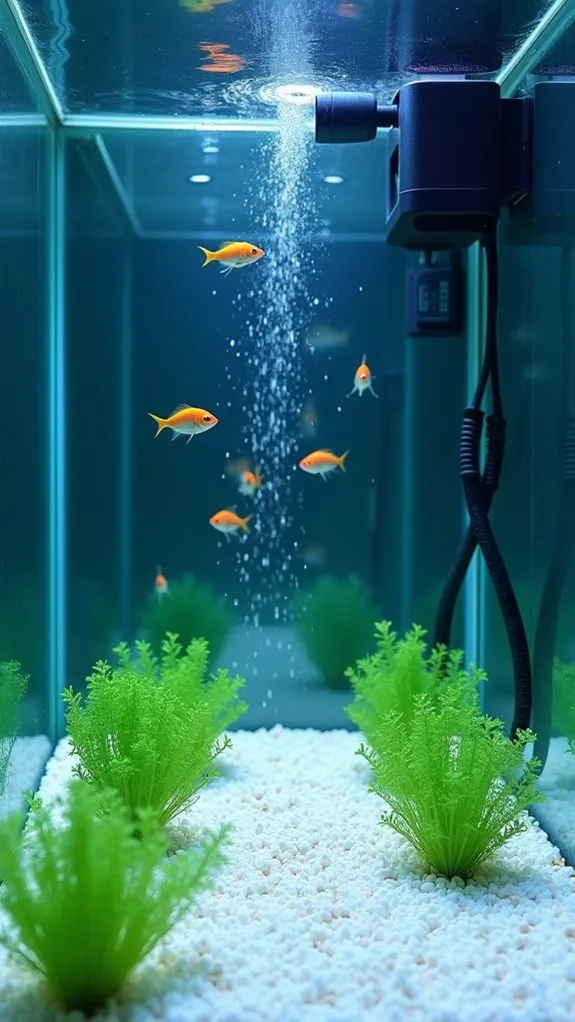
You'll need to set a regular cleaning schedule for your aquarium, just like you wouldn't skip brushing your teeth for weeks at a time.
When cleaning, make sure to unplug all equipment before starting any maintenance work for safety.
Keeping up with basic maintenance tasks, such as changing 25% of the water every 1-2 weeks and checking your filter system, will prevent those funky fish tank odors from developing. Regular water changes help maintain optimal conditions and keep harmful chemicals in check, preventing unpleasant smells. Testing your water parameters weekly helps catch problems before they lead to unpleasant smells.
Your filter is especially important since it's basically your tank's air purifier, so you'll want to clean or replace the filter media according to your manufacturer's guidelines – typically every month or when you notice reduced water flow.
Regular Tank Cleaning Schedule
Maintaining a regular cleaning schedule is essential for preventing unpleasant tank odors and keeping your aquarium healthy. Your tank cleaning schedule frequency should include daily, weekly, bi-weekly, and monthly tasks to guarantee your aquatic friends stay happy and healthy.
Start each day with quick maintenance checks – you'll want to monitor your filter's performance, observe your fish's behavior, and remove any uneaten food. Always test your water with reliable testing kits to ensure ammonia stays below 0.5 ppm. Make sure to use aquarium-safe products when cleaning any decorations or surfaces.
Weekly tasks are your first line of defense against unwanted smells: perform a 10-20% water change, vacuum the gravel, and scrub away any algae that's trying to take over your tank walls.
Every other week, it's time to roll up your sleeves for a deeper clean. Perform a 25% water change, give your decorations a thorough cleaning, and don't forget to add those beneficial bacteria that keep your tank's ecosystem in balance.
Monthly maintenance brings the big guns: replace your filter cartridge, fertilize your plants, and conduct a detailed inspection of your entire setup. Think of it as your tank's monthly health check-up – because nobody likes a stinky surprise from their underwater paradise!
Filter Maintenance Basics
Proper filter maintenance stands at the heart of a healthy aquarium system. If you've ever wondered why your tank's starting to smell a bit fishy, your filter might be crying out for attention!
Different filter types need cleaning at varying intervals, with canister filters typically lasting 4-6 weeks between cleanings. Regular cleaning helps prevent brown gunk buildup from decomposing waste and uneaten food. Maintaining a clean filter supports the overall balance of the nitrogen cycle.
You'll want to make filter cleaning a regular part of your maintenance routine, and it's not as complicated as you might think.
Start by turning off all your equipment before diving in. When you're ready for filter cleaning, grab a bucket of old tank water (not tap water – that's a big no-no!), and gently clean your filter media in it.
You'll want to be careful not to scrub too hard, as those beneficial bacteria are your tank's best friends. For best results, stagger your media replacement instead of changing everything at once.
Don't forget to give special attention to the impeller and hoses – they're like the heart and arteries of your filter system. Use a soft brush to clean these parts, and always check for leaks when you're putting everything back together.
Proper Filtration Systems
You'll want to start with a reliable filtration system that combines mechanical, biological, and chemical filtration to keep your tank fresh and odor-free.
Your filter's mechanical components will trap debris while the biological elements break down waste, and chemical filtration tackles those lingering smells that might otherwise make your living room smell like a fish market.
It's amazing how a well-maintained filter system can transform your aquarium from potentially stinky to perfectly pleasant, making both you and your fish happier. Regular cleaning and monitoring practices ensure that the filter continues to operate effectively and supports a healthy environment for your aquatic life.
Filter Types And Benefits
A well-chosen filtration system serves as the cornerstone of a fresh-smelling aquarium. When it comes to filter selection tips, you'll want to take into account your tank's size and specific needs to maximize filtration efficiency.
For smaller tanks, you can't go wrong with a hang-on-back power filter – they're like the trusty family sedan of the aquarium world. They're easy to maintain and provide all the essential filtration types your fish need.
If you've got a larger setup or lots of fish, you'll want to think about a canister filter. Sure, they're a bit pricier upfront, but think of them as the luxury SUV of filtration – powerful, customizable, and built to handle heavy loads.
Sponge filters are perfect if you're keeping delicate fish or breeding tanks, as they provide gentle filtration that won't stress your aquatic friends.
Internal filters are your space-saving champions, ideal when you're working with limited room but still need effective filtration. They're like the compact cars of the filter world – small but mighty! Additionally, ensure that your chosen filter type includes mechanical and biological filtration, which are crucial for maintaining water clarity and fish health.
Maintenance For Peak Performance
With the right filter in place, maintaining it becomes your next mission in preventing tank odors. Your filter's efficiency depends entirely on how well you stick to regular maintenance routines, and trust me, your fish will thank you for it!
You'll want to clean your mechanical filters weekly to prevent debris build-up, but here's a pro tip: always use tank water, not tap water, when rinsing filter media. This keeps those beneficial bacteria happy and working hard to combat odors.
Don't forget to swap out your chemical media, like activated carbon, every 4-6 weeks – it's like giving your filter a fresh set of lungs. Regular testing of water parameters is essential to ensure optimal conditions for the health of your fish.
Make it a habit to inspect your filter's parts weekly, especially the impeller and inlet cage. These areas can get gunked up faster than you'd think!
If you notice reduced water flow or hear your filter making unusual sounds, it's probably crying out for attention. Schedule your filter maintenance alongside your regular water changes to make it part of your routine, and adjust the frequency based on how many fish you have.
Water Quality Management
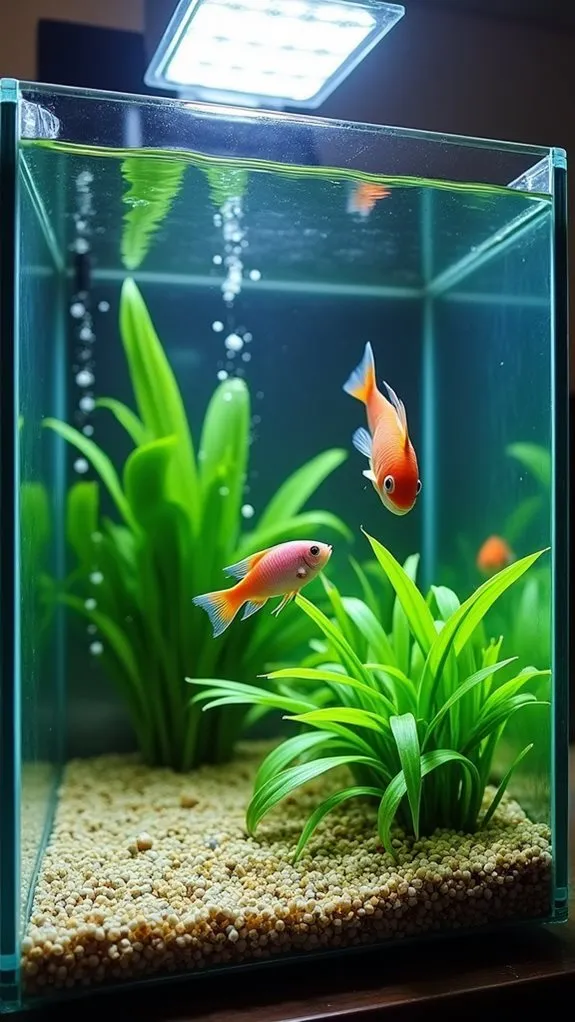
Maintaining proper water quality is the foundation of a fresh-smelling aquarium. By monitoring your water chemistry regularly, you'll catch problems before they turn your tank into an unwanted air freshener.
Start by testing ammonia, nitrite, and nitrate levels daily – these sneaky compounds are often the culprits behind those fishy odors you're trying to avoid.
You'll want to keep a close eye on pH levels and temperature, as fluctuations can stress your fish and lead to algae management issues. Use your test kit like a detective's toolkit, searching for clues that something's off.
When you spot trouble, don't panic – a partial water change of 25-30% can work wonders in diluting those pesky toxins.
Make sure you're using the right tools for the job. A quality filtration system with biological, chemical, and mechanical components is your best friend here. Additionally, regular water changes are vital for maintaining nutrient balance and overall health in your aquarium.
Don't forget to add activated carbon to your filter – it's like a magnet for those unwanted odors. Keep your filter clean and running efficiently, and you'll be amazed at how fresh your aquarium stays.
Feeding and Stocking Guidelines
Proper feeding and stocking practices play an essential role in preventing aquarium odors. You'll want to establish a consistent feeding frequency of 2-3 times daily, but remember – your fish aren't bottomless pits! Only offer what they can eat within 2-5 minutes, or you'll end up with decomposing food that turns your tank into an unwanted air freshener.
Understanding species needs is vital for both feeding and stocking. Some fish, like those nocturnal bottom-feeders, prefer their midnight snacks, while others are early birds. You'll need to mix up their menu with various food types – think of it as running a fish restaurant with different dietary requirements.
Don't forget those picky eaters like Plecos, who need their veggies and driftwood! Water quality management is also crucial, as poor water conditions can exacerbate odors and harm fish health.
When it comes to stocking, think of your tank as a tiny underwater neighborhood. You wouldn't want to cram too many residents into a small space! Follow the inch-per-gallon rule as a starting point, but always consider the adult size of your fish.
Air Circulation Solutions
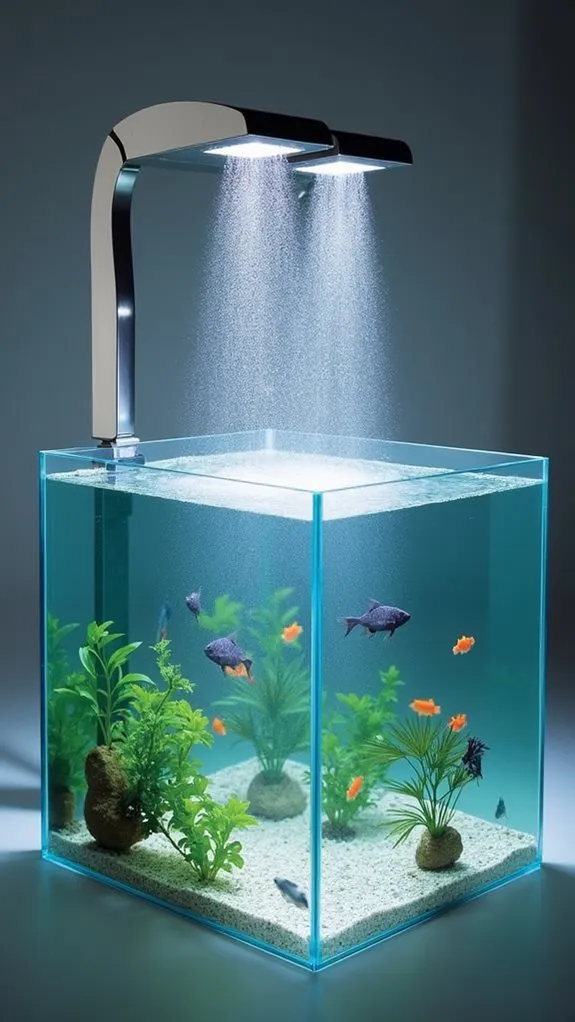
Circulating water effectively is your tank's secret weapon against unwanted odors. You'll want to reflect on several equipment options that'll keep your aquatic friends swimming in pristine, clean water.
Let's explore the wavemaker benefits: they're excellent for creating natural water movement that mimics rivers and streams, though you'll need to adjust them carefully to avoid stressing your fish.
For smaller tanks or gentler needs, air stones are your budget-friendly best friends. Their effectiveness comes from creating those tiny bubbles that break the water's surface tension and boost oxygen levels. You can strategically place them in low-flow areas to create natural upward currents – it's like giving your tank a refreshing gust of air!
Don't forget about proper filter selection – it's the backbone of your tank's circulation system. You'll want to match your filter to your tank's size and keep it well-maintained. This maintenance is crucial since an efficient filter plays a key role in maintaining balanced water quality.
When setting up your equipment, create clear pathways for water flow by carefully positioning your decorations and plants. Think of it as creating underwater highways for your filter's cleaning crew to do their job effectively.
Regular maintenance of your circulation equipment will keep those funky smells at bay.
Frequently Asked Questions
Can Fish Tank Odors Affect My Pet Cat or Dog's Health?
Yes, fish tank odor sources like ammonia and nitrates can harm your pet's health. Your cat or dog may experience respiratory issues, eye irritation, and other health problems from prolonged exposure to these toxic gases.
Why Does My Tank Smell Worse After Adding New Decorations?
Your tank smells worse because new decorations can release chemicals and trap debris, leading to bacterial growth. You'll need proper decoration cleaning and regular tank maintenance to prevent these unwanted odors from developing.
Does Using Air Fresheners Around My Aquarium Harm the Fish?
Yes, you shouldn't use air fresheners near your aquarium as they're toxic to fish. These chemicals harm water quality and can kill your fish. Consider natural fragrance alternatives like houseplants to maintain good air quality.
Should I Add Salt to Reduce Tank Odors in Freshwater Aquariums?
Don't add salt for odor prevention in your freshwater tank. While salt has other benefits for treating specific conditions, it won't reduce smells. Instead, focus on regular water changes and proper tank maintenance to control odors.
Can Outdoor Temperatures Affect How Much My Fish Tank Smells?
Yes, outdoor temperature fluctuations can affect your tank's smell. When temperatures rise, bacteria multiply faster and fish produce more waste. You'll notice seasonal changes impact odors, especially during warmer months or extreme weather.
Final Thoughts
You'll find that maintaining a fresh-smelling aquarium isn't rocket science – it's all about consistency and attention to detail. By following proper cleaning routines, maintaining your filtration system, and monitoring water quality, you'll create a healthy environment that both you and your fish will love. Remember, a well-maintained tank not only smells better but also keeps your aquatic friends happy and thriving. Stay committed to these practices, and you'll enjoy crystal-clear water and fresh air around your tank.

